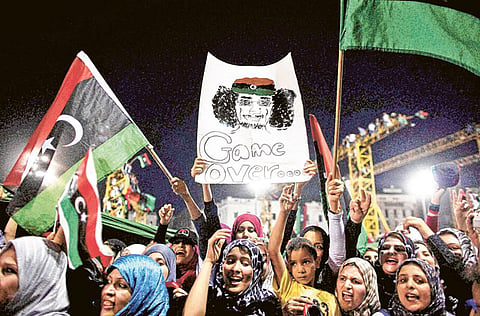Making Gaddafi face the music
Debate rages about how to treat the toppled despot should he be found alive

La Jolla: As revolutionaries shore up control of Libya and hunt for the man who ruled the country for 42 years, the legal prospects for Muammar Gaddafi are as murky as the political vacuum he leaves behind.
In the days since revolutionary forces moved into Tripoli and found that Gaddafi had bolted, several senior members of the umbrella National Transitional Council (NTC) have insisted the next government can and will try him for crimes committed against the Libyan people.
At the same time, Gaddafi, one of his sons and his former military intelligence chief are wanted for alleged crimes against humanity by the International Criminal Court (ICC). The Hague-based institution was created a decade ago by the Rome Statute, a treaty now ratified by 117 countries, as a successor to war-crime tribunals for the former Yugoslavia and Rwanda.
And several members of the US Congress say they want Gaddafi brought to the United States to face charges for the 1988 bombing of Pan Am Flight 103, which killed 203 people, and a 1986 assault on a Berlin discotheque that killed two US servicemen.
New British, French and German claims on Gaddafi could also emerge from decades-old terrorism blamed on Libya, while neighbouring Chad or other past enemies could jump into the fray.
Legal authority
There is no one legal authority governing what happens to an ousted dictator with a history of repression at home and terrorism abroad.
If Gaddafi is taken alive, it will probably be politics rather than international law that would determine where he faces prosecution, just as global politics at the UN Security Council generated the case against Gaddafi at the ICC. After the fall of Tripoli last week, Obama administration officials stressed that Libyans themselves should decide what happens to Gaddafi, as long as the solution meets "the highest standards of international justice".
But last week Secretary of State Hillary Clinton and other US diplomats suggested Gaddafi's future is a less-important priority than securing Libya's chemical weapons, reducing the potential for Islamic extremism there and steering the new Libya toward democracy.
In a background briefing ahead of Clinton's meeting with NTC leaders in Paris last week, two senior State Department officials said "the Gaddafi situation" would not be discussed in detail, let alone be an issue that Washington is going to push. Clinton did not mention Gaddafi's legal status at a post-meeting news conference.
Of course, the problem with leaving a Gaddafi trial to the Libyans is that they currently have no judicial system.
Under Gaddafi, Libya's justice system was based on Islamic law, but special "revolutionary courts" and military courts dealt with all perceived political offences and crimes against the state.
The Benghazi-based TNC has repeatedly said it wants to draft a new constitution, without saying what that would look like.
The sometimes-contradictory statements on Gaddafi and other subjects coming from NTC — fraught with ethnic and regional divisions that hobbled its battlefield plans — have not fostered confidence in the revolutionaries' ability to govern or produce a working legal framework.
"No one has a sense of what they'll do," said David Kaye, the head of UCLA's International Human Rights Law Programme and a former legal adviser to the American Embassy in The Hague, who participated in the Yugoslav war-crimes trials.
Complicating a potential Libyan prosecution is that several NTC officials were once high-ranking members of Gaddafi's regime, who may have blood on their own hands and might be reluctant to see the past hashed out in court, Kaye said. It is possible a fledgling Libyan successor to Gaddafi's regime would want to curry international favour by sending him to the ICC, or that if Gaddafi is caught abroad another government would do so.
A prosecution in The Hague would put Gaddafi in a much more established legal setting.
The ICC in June issued arrest warrants for Gaddafi, his son and onetime heir Saif Al Islam Gaddafi, and spymaster Colonel Abdullah Al Senussi for crimes against humanity.
Prosecutors charged that after the governments of Tunisia and Egypt collapsed during the "Arab Spring," Gaddafi used state forces and resources to deter and quell "by any means, including by the use of lethal force, the demonstrations of civilians against the regime."
The charges only cover crimes allegedly committed during the last two weeks of February, and an eventual ICC prosecution could include more charges and more members of Gaddafi's family and government.
ICC rules allow member states to deal with war crimes on their own first, but Libya is not a member state. (Neither is the United States, though the Obama administration has promised to cooperate with the ICC.) Like the trials for war crimes in the former Yugoslavia and Rwanda, an ICC trial of Gaddafi would likely take years of pre-trial investigations, depositions and actual testimony before reaching a verdict.
The prosecutors would have to take the broad charges laid out in the arrest warrants and build a case through hundreds and possibly thousands of witness interviews and evidence gathered on the ground in Libya. With such cases at the tribunal for the former Yugoslavia, that included block-by-block video recordings in many of the towns where atrocities took place.
The ICC would pay for counsel if an exiled Gaddafi could not afford his own lawyers, and he would have the right to challenge the admission of all the evidence and the testimony of the witnesses.
Sign up for the Daily Briefing
Get the latest news and updates straight to your inbox


